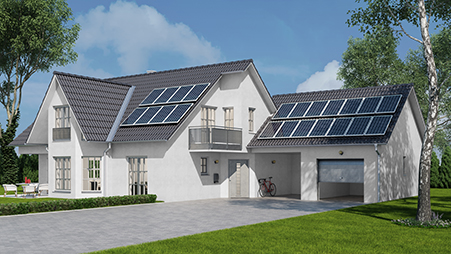As the cost to install sustainable energy systems continues to drop, more and more Americans are expected to go green with home energy. If you’re curious about how sustainable, renewable energy can power your home, or about how it could benefit your wallet in the long run, we’re here to help.
What is Renewable Energy?
You’ll often hear renewable energy described as sustainable energy or clean energy. According to the Natural Resources Defense Council, “renewable energy comes from natural resources or processes that are constantly replenishing.” Some of the most popular sustainable energy sources include wind, sun, and water.
First and foremost, you need the right conditions to capitalize on these forms of energy. Daylight and weather conditions can impact utilization of renewable energy sources. The biggest benefit of using a renewable energy source is that the source is not likely to ever run out or expire. It’s simply a matter of harnessing the power within these natural energy sources and converting it into the forms of energy needed to power a home.
5 Common Sources of Sustainable Renewable Energy for Your Home
There are several types of renewable energy sources you can tap into to power your home. Depending on your energy needs, sustainable resources can power your whole home, or offset your electric and gas bills. These sources include:
- Solar electric systems: These systems capture the sun’s energy and turn it into electricity.
- Wind electric systems: Wind turbines convert kinetic energy from the wind into electricity.
- Microhydropower systems: These systems work well for people who have water flowing through their property.
- Hybrid systems: Typically combining wind and solar energy systems, a hybrid system allows you to take advantage of more than one type of renewable resource and supply more sustainable energy to your home.
- Geothermal systems: Built under the ground, a geothermal system is ideal for new construction. It uses a pump to heat or cool your home.
How to Incorporate Renewable Energy Into Your Home.
If you’re interested in switching over to a renewable energy system, your first step will include extensive research on your needs and options. Start by researching:
● Your electricity load. How much electricity do you need to power your home? Are there other things you need to power from home, such as an electric car? Do your energy needs vary based on time of day or year?
● Local guidelines. Local codes, regulations, and guidelines will likely narrow down your choices for sustainable energy alternatives. You’ll also want to research what types of power can be connected to your local grid.
● Weather patterns in your area. Weather has a major impact upon sustainable energy efforts. Make sure you have a thorough understanding of the weather in your area and how it will affect your efforts to go clean. For example, Seattle might not be the best place to install a solar panel due to its perpetually cloudy, rainy days.
● Cost and convenience factors. Once you have narrowed your clean energy options down based on electric needs, local guidelines, and weather conditions, you can start digging into cost, installation, and maintenance.
For an extensive guide to implementing a renewable energy system in your home, visit energy.gov
How Does Renewable Energy Impact My Bank Account?
Depending on your system and energy generation/usage, installing solar panels, wind turbines or other green energy options can not only save you money but may also make you money.
Some states and energy carriers allow you to sell your unused clean energy back to the grid. According to How Stuff Works, homeowners can make around $3,000 a year by selling back their unused energy combined with government clean energy incentives.
You can also expect increases in your home’s value. The National Renewable Energy Laboratory and the Appraisal Institute agree that adding sustainable energy to your home dramatically increases its value. Past studies have shown that home values can increase by $15,000 for a home with an average solar system.
Before installing a new sustainable energy system in your home, research how it can impact your yearly and lifetime savings to determine the ROI on your investment.
While there is certainly a lot to think and learn about when making the decision to invest in renewable energy, it can be worth the time and effort to determine if one of these green energy options is cost-effective for you. If you’re interested in learning more about implementing renewable, sustainable energy for your home, check out the following sources:
● Energy.gov
● EIA.gov
● EPA.gov
● CBSNews.com
For more information on how renewable energy can affect your current property value or if you are looking to purchase a home with a system already installed, speak to a Guardian Mortgage professional today.
CONTACT A LOAN EXPERT

